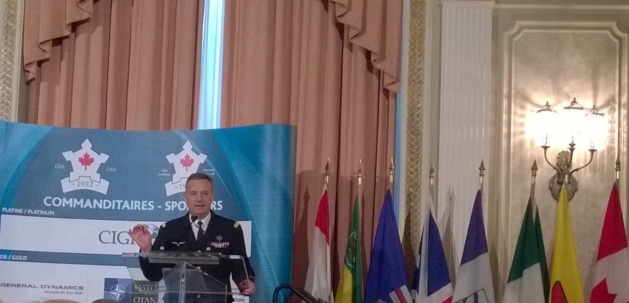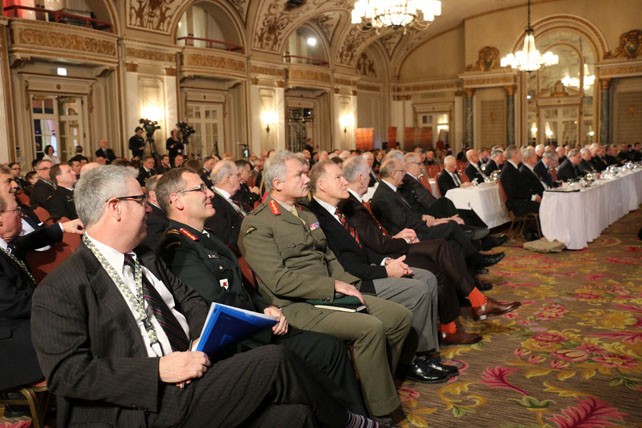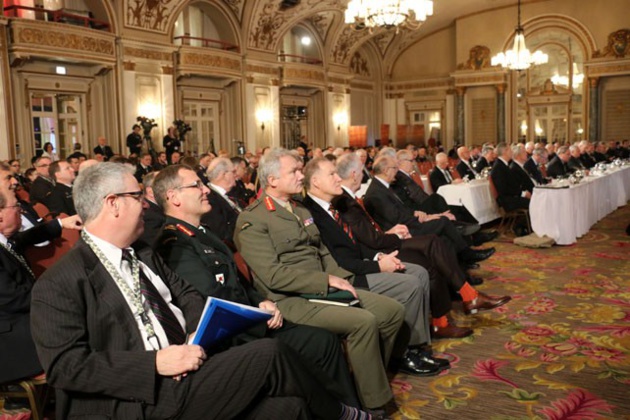
Credit Salomé Ietter
In the turmoil after the controversy on Canada’s role in Iraq, this conference forms part of a rich actuality in the Canadian defence. The titles of the two days set the tone: “A Complex and Dangerous Security Environment” and “Defence Policy for a Dangerous World”. By taking their distance, the different presentations and panels set the terms of debate from these points of view. Senior members, vice-chiefs of staff, academics, former and actual politicians follow one another, represented at the same time a handful of countries such as the United-States, United Kingdom, France, Australia and Canada.
The introduction of this series of conferences by Ferry de Kerckhove, former ambassador of Egypt, launched discussions about the lack of concrete leadership in defense strategies. Some guests will support the need to take from its national sovereignty in order to satisfy the demands concerning cooperation and compromise linked with defense. This leadership’s objective is to think in an environment of transnational threats which are, primarily, set on the outside and which are perceived as consistent for the national territory. If the year 2014 was marked by the retreat of troops from Afghanistan, it also saw the opening of two new fronts: in Ukraine and against the Islamic state.
As Canada is facing new challenges, the Harper government is making deep budget cuts in the army. Many speakers were critical about the under-equipment of the Canadian armed forces, excepted Canada’s new minister of Defence, Jason Kenney, who said that he was “impressed” by the material capacities of his armies. Putting aside this very political intervention, Canada isn’t the only one hit by this tendency. The general staff of French armed forces, Gratien Maire, reports the paradox the French army has to confront. While safety demands are rising, the military programming law spanning 2014-2019 entails the loss of 24 000 positions in the army.
Despite the upcoming Canadian election in October 2015, Ferry de Kerckhove observes that defence policies are not really an electoral issue for Canadians. The public support for defence strategies is no less crucial to guarantee the Canadian armed forces’ future, especially in term of budget. The budget cuts will be indeed more than justified if the population doesn’t see the interest in the missions lead by the armed forces. An IPSOS survey, presented by Darrel Bricker on the second day of the Congress, estimates the Canadians’ point of views and tries to define the priorities to which the decisions of the ministry deployment should be based on.
The priorities fall within the context of domestic imperatives but support can be found when outside interventions have a domestic value. The example of the fight against terrorism.is perfect to illustrate this internalization logic of an external threat. More than 83 % of the participants of this survey consider that the world became more dangerous in 2014. The figure shows also that there is a support of 64 % of the population for air raids in Syria. According to Darrel Bricker, media played an important role in the evolution of this figure by presenting unanimously the “barbarity” of the Daesh group. Moreover, the events of the 21 and 22 October 2014 in Canada made it “more intimate” for its inhabitants.
The enemy within and without
The question of the fight against terrorism was, of course, in all discussions. On one hand, in terms of domestic threat, to which Jason Kenney reaffirmed the draft law C-51. This law of counter-terrorism was tabled for first reading at the Canadian Parliament on the 30th January. Much has been said about this law, particularly with regard to its broadness, which would allow a great number of incursions in civil liberties to guarantee security. The minister of Defence choosed to echo these polemics by stating that “security is not incompatible with liberty. In fact, it allows it.”
On the other hand, terrorism remains an external threat to the allies of Canada and other represented countries. With the help of metaphors, Gratien Maire, describes Sahel as a metastatic cancer which forms the Jihad movement. He also defines the Levant in Syria and in Iraq as the enemy’s matrix. The French high-ranking officer, “we have no other choice than to intervene”. The question which is now asked is to choose in which type of intervention we should engage.
Operation IMPACT’s future
The operation IMPACT is the Canadian armed forces support next to the Middle East Stabilization Force, the multinational coalition against the Islamic State of Iraq and the Levant. During a press conference on Thursday 19 February, the minister of Defence stated that the future of this operation should soon be voted. He also said that “Canada has to play a role in the fight against the Islamic state, it is its responsibility. We now have to define which role it will play.” The prolongation of the Canadian involvement in the region leaves no doubt. Furthermore, the surveys show that Canadians don’t seem to be in favor of an offensive option even though it is far from unanimous.
“Solve a situation that we created ourselves”. This paradox is illustrated by the fight against the Islamic state, for Chris Kilford, reminding us that the attempted overthrow of Bachar al-Assad was made without anyone thinking what was going to happen next. The actual threats’ unpredictability leads too often to an under-estimation of survey for future possibilities. He calls to think about this after Islamic state, to for the time being try to organize strategies in terms of long term interests and also to plan which attitude should be adopted against the emptiness that will follow the retreat of the jihadists troops at the Turkish border.
The survival of the Islamic state raises different opinions. Some see in the group an important potential of resources and power: they would control about 60 % of Syrian oil resources. Michael Dougall Bell, former Canadian ambassador in Jordan, in Egypt and in Israel, estimates that the caliphate project is too demanding and that the organization extremism will be fatal. Though they constitute the most media coverage, it is essential to considerate “the other nationalism”, the other actors of the conflict, in order to establish the most appropriate strategies to the complexity of the field.
“Give peace a chance”: the future of UN’s operations
For Peggy Mason, president of Rideau Institute, it is more than important to “give peace the chance it deserves”. This former Canadian ambassador for UN disarmament states that bringing every part of the conflict, including those “classed as terrorists”, in the center of the negotiations, would bring more legitimacy to the conflict resolutions process. “Far from being philanthropy”, she insists also on the lake of legitimacy of an armed intervention led by states. The credibility of the interventionism could be found by the reinvestment in the UN peacekeepers. This would allowed to appease the criticisms on state interests by the investments of different Western armies. This is not the perfect solution but this institutionalism view carries the hope in the stabilization which can allow the little world organizations that we concretely dispose of as of today.
For the French Major General, the world is simply “differently dangerous”. It is necessary to adapt safety practices to new referents in order to have a better comprehension of dangerous situations and to bring protection to societies, which are subject to far more serious threats than the States. In this, so called, “new world 3.0”, the armies aren’t the only tools even though “they are, unfortunately, sometimes the only answer used”. The British Major General Gordon Messenger adds his critical perspective of sometimes obsolete strategic conceptions: “We understand the world today as it was yesterday”. He asserts the superiority of the need to share the need to know, thus questioning the isolation era of the intelligence services. The first thing to do in order to fight against dichotomies in safety speeches such as one of global extremism and the prevalence of state sovereignty.

Faced with this humble British touch, the intervention of the Canadian vice Chief of the Defence Staf, Guy R. Thibault, demonstrates patriotism that we would tend to stereotype to the “American one”. His pride is palpable when he starts his presentation by a recruitment add for the armed forces. During his conference, we can easily feel the gap between the European and North-American military conceptions. According to Paul Dubois, former Canadian ambassador in Germany, Europe doesn’t want a military budget anymore and doesn’t show signs of going back to the “militaristic” trend.
If the majority of the spoken perspectives of those last two days stayed united, some personalities offered keys to rethink military strategies. For Michael Dougall Bell, it remains a recurring problem to understand that nothing can be durably solved with an “up and down” approach. We also need to break away from the idea of victory that we cherish so much because of its feeling of accomplishments and immediacy. The long-term is, without a doubt, the biggest challenge the armies have to face and also the keyword to this conference, highlighting the destructive short-term visions paradoxes even though it is politically “legitimate”.
The sparse media coverage of this event shows the injustice faced by the richness of the personal experiences of the speakers and participants of this conference. If the armed forces are truly going to adapt, evolve and give up many principles which were their past and their glory, they won’t do it without the input of a common reflection from the population and academic world.































